Daily Word of Grace has concluded as of June 11, 2021. Please enjoy the past posts. Older posts can be found on our archive page here.

Daily Word of Grace # 261 (June 11, 2021)
In the late eighteenth century Robert Robinson (1735-1790) wrote one of the most gospel soaked hymns ever written: “Come thou font of every blessing, tune my heart to sing thy grace! Streams of mercy never ceasing, call for songs of loudest praise. Teach me some melodious sonnet, sung by flaming tongues above. Praise the mount! Oh, fix me on it, mount of God’s unchanging love.” God is indeed the “font of every blessing” (James 1:17) and therefore the only One who can rightly tune our hearts to sing God’s praise. And because the mercies of the Lord “never come to an end” and “are new every morning” (Lamentations 3:22-23) the divine “streams of mercy” are indeed “never ceasing.” The “mount of God’s unchanging love” is Calvary, where Jesus Christ died to prove that indeed even though you live in an ever changing world, God’s love for you is never changing (Romans 5:8). All of this is the fruit of God’s grace, as reflected in the final verse of this hymn: “Oh, to grace how great a debtor daily I’m constrained to be! Let thy goodness, like a fetter, bind my wandering heart to thee: prone to wander, Lord, I feel it, prone to leave the God I love; here’s my heart, oh, take and seal it, seal it for thy courts above.” Your salvation begins with the grace of God, continues with the grace of God, and because of the grace of God…never ends.
Love and Prayers,
Dave
Daily Word of Grace # 260 (June 10, 2021)
Christianity is a resurrection faith. As we state in the Nicene Creed, “We look for the resurrection of the dead, and the life of the world to come.” One of the high water marks in The Book of Common Prayer is “The Burial of the Dead”, which begins with these two opening anthems. The first is directly from the New Testament: “I am the Resurrection and the Life, says the Lord. Whoever has faith in me shall have life, even though he die. And everyone who has life, and has committed himself to me in faith, shall not die forever” (John 11:25-26, BCP 491). Jesus spoke these words to Martha before raising her brother Lazarus from the dead. The second anthem is directly from the Old Testament: “As for me, I know that my Redeemer lives and that at the last he will stand upon the earth. After my awaking, he will raise me up; and in my body I shall see God. I myself shall see, and my eyes behold him who is my friend and not a stranger” (Job 19:25-27, BCP 491). Job spoke these words before he was healed and restored after suffering unspeakable loss. The One who created you is the One who saves you, the One who restores you, the One who assures you eternal life—and because God always keeps his promises you can rest assured even before your experience these things. Death was neither the end of the story for Job, nor the end of the story for Jesus, and therefore will not be the end of the story for you.
Love and Prayers,
Dave

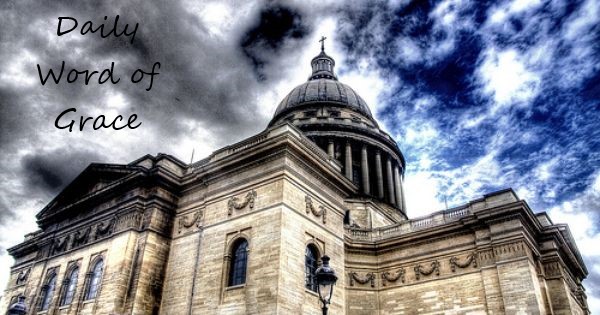
Daily Word of Grace # 259 (June 9, 2021)
A couple years ago I had the privilege of visiting Paris, the City of Light, certainly one of the most beautiful cities on earth. In the 5th arrondissement is the Pantheon, where several French luminaries are entombed, including the acclaimed nineteenth century novelist Victor Hugo (1802-1885). It was overwhelming for me to stand by his tomb because he is the author of my favorite novel of all time, Les Miserables (1862), the most grace saturated novel I have ever read. Over and over again grace—unearned, unconditional, one-way love—is received and then given away. This is particularly the case with the main character, Jean Valjean, a criminal who stole from a bishop who had taken him in when he had nowhere else to go. When captured and dragged back to the bishop’s residence by gendarmes, Jean Valjean was not only completely forgiven and absolved by the bishop but also told to keep what he had stolen, and even given even more on top of that. That grace experienced by Jean Valjean set in motion the recurring theme of grace throughout the rest of the novel, as Jean Valjean in turn gave grace to others again and again. Along these lines Les Miserables includes countless observations that ring true to life, including this one: “The ultimate happiness in life is the conviction that one is loved; loved for oneself—better still, loved in spite of oneself” (2012 translation by Julie Rose, 141). That is exactly what God’s love for you is like, now and always. And the best response to God’s love is to follow the example of Jean Valjean and give it away to others…again and again.
Love and Prayers,
Dave
Daily Word of Grace # 258 (June 8, 2021)
During his first imprisonment in Rome the Apostle Paul wrote his Letter to the Philippians, a letter replete with the theme of joy: “I rejoice, yes, and I will continue to rejoice” (Philippians 1:18), “make my joy complete” (2:2), “I am glad and rejoice with all of you—and in the same way you also must be glad and rejoice with me” (2:17-18), “Rejoice in the Lord always; again I will say, Rejoice” (4:4)—on and on. If this letter was written by someone imprisoned for the gospel, why does it overflow with joy and repeatedly reiterate the command to rejoice? Because the Apostle Paul had experienced the unconditional love of God in Jesus Christ, even while imprisoned, a love for which he had willingly lost everything: “Whatever gains I had, these I have come to regard as loss because of Christ. More than that, I regard everything as loss because of the surpassing value of knowing Christ Jesus my Lord. For his sake I have suffered the loss of all things, and I regard them as rubbish, in order that I may gain Christ and be found in him, not having a righteousness of my own that comes from the law, but one that comes through faith in Christ, the righteousness of God based on faith. I want to know Christ and the power of his resurrection and the sharing of his sufferings by becoming like him in his death, if somehow I may attain the resurrection from the dead” (3:7-10-11). Paul knew beyond a doubt that whatever he would go through, the final word on his life belonged to the One whose love he experienced so thoroughly—and so no matter what happened to him, he rejoiced and overflowed with joy.
Love and Prayers,
Dave


Daily Word of Grace # 257 (June 7, 2021)
The penultimate song of Bob Dylan’s 1975 masterpiece album Blood on the Tracks is the hauntingly beautiful song about something each of needs from time to time “Shelter from the Storm,” a song about a cynical burned out traveler being invited to rest: “’Twas in another lifetime, one of toil and blood. When blackness was a virtue and the road was full of mud. I came in from the wilderness, a creature void of form. ‘Come in,’ she said, ‘I’ll give you shelter from the storm…Not a word was spoke between us, there was little risk involved. Everything up to that point had been left unresolved. Try imagining a place where it’s always safe and warm. ‘Come in,’ she said, ‘I’ll give you shelter from the storm…I was burned out from exhaustion, buried in the hail. Poisoned in the bushes and blown out on the trail. Hunted like a crocodile, ravaged in the corn. ‘Come in,’ she said, ‘I’ll give you shelter from the storm.” The gracious recurring refrain of the unnamed lady in this song always reminds me of the gracious invitation Our Savior continually extends to all of us, especially when “burned out from exhaustion, buried in the hail”: “Come to me, all you that are weary and carrying heavy burdens, and I will give you rest. Take my yoke upon you, and learn from me; for I am gentle and humble in heart, and you will find rest for your souls” (Matthew 11:28-29). “Come in,” Jesus said, “I’ll give you shelter from the storm.”
Love and Prayers,
Dave
Daily Word of Grace # 256 (June 4, 2021)
The three books that have influenced the development of the English language more than any others are The Book of Common Prayer, the Works of William Shakespeare, and the King James Version of the Bible (aka the Authorized Version). The KJV was published in 1611 during the reign of King James I and VI and has a rather lengthy title: “The Holy Bible, Containing the Old Testament and the New: Newly Translated out of the Original Tongues and with the Former Translations Diligently Compared and Revised by His Majesty’s Special Commandment.” The “Epistle Dedicatory” of the KJV contains this beautiful description of what a treasure the written scriptures are: “But among all our joys, there was no one that more filled our hearts, than the blessed continuance of the preaching of God’s sacred Word among us; which is that is inestimable treasure, which excelleth all the riches of the earth; because the fruit thereof extendeth itself, not only to the time spent in this transitory world, but directeth and disposeth men unto that eternal happiness which is above in heaven.” And how do the scriptures do this? By pointing us to salvation in Jesus Christ, as the Apostle Paul wrote to his protégé Timothy, “From childhood you have known the sacred writings that are able to instruct you for salvation through faith in Jesus Christ” (2 Timothy 3:15). Indeed the scriptures “excelleth all the riches of the earth”—what a priceless gift from God!
Love and Prayers,
Dave


Daily Word of Grace # 255 (June 3, 2021)
When you meet someone for the first time, after exchanging names and pleasantries the next question is often, “So what do you do?” meaning “What is your career?” Many 17 and 18 year old high school graduates go to college in order to decide on a “career path” and prepare accordingly. In his powerful 2007 book Grace in Practice Paul Zahl connects “grace” with the desire for a “career”: “Everyone wants a career. Everyone thinks it is the thing to do. Whether this is fashion or not, grace turns it upside down. Not only is career, from the standpoint of grace, a mighty joke—for a career spits you out as rapidly as it sucks you in—and not only is it dominated overwhelmingly by the principle of law as it fixes your path, but grace declares that real ‘work’ is created only when it springs from belovedness. Grace declares the end of all ‘career paths’ that envisage a concrete goal…For when work is produced from natural desire and motive, rather than from the idea of actions resulting in proposed consequences, the best work is done” (72-73). This sounds counterintuitive because it is, for a life of grace is not confined to and defined by a “career path” but rather the freedom of the grace of God. Jesus never commanded us to follow a “career path” but rather to follow Him—as the very first words and very last words scripture records Jesus telling the Apostle Peter are exactly the same: “Follow me” (Mark 1:16-17 and John 21:19).
Love and Prayers,
Dave
Daily Word of Grace # 254 (June 2, 2021)
In his 1949 book The Weight of Glory C. S. Lewis (1898-1963) insightfully and unsettlingly observes a very important distinction when it comes to God’s forgiveness: “I find that when I think I am asking God to forgive me I am often in reality (unless I watch myself very carefully) asking Him to do something quite different. I am asking Him not to forgive me but to excuse me. But there is all the difference in the world between forgiving and excusing. Forgiveness says ‘Yes, you have done this thing, but I accept your apology; I will never hold it against you and everything between us two will be exactly as it was before.’ But excusing says ‘I see that you couldn’t help it or didn’t mean it; you weren’t really to blame.’ If one was not really to blame then there is nothing to forgive. In that sense forgiveness and excusing are almost opposites…the trouble is that what we call ‘asking God’s forgiveness’ very often really consists in asking God to accept our excuses” (133). Yikes! I wish this were not the case but as usual, C. S. Lewis is right, and cuts right to the quick. Receiving God’s forgiveness involves genuine repentance and moving forward in a new direction. This is reflected beautifully in the confession of sin from The Holy Eucharist: Rite I in which we pray, “for thy Son our Lord Jesus Christ’s sake, forgive us all that is past; and grant that we may ever hereafter serve and please thee in newness of life” (The Book of Common Prayer 331).
Love and Prayers,
Dave

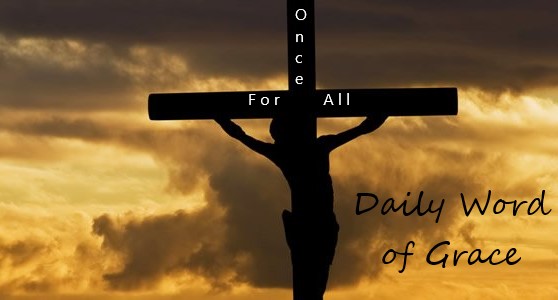
Daily Word of Grace # 253 (June 1, 2021)
When it comes to our salvation in Jesus Christ there is a very powerful recurring phrase in scripture: “once for all.” The Apostle Peter wrote, “For Christ also suffered for sins once for all, the righteous for the unrighteous, in order to bring you to God” (1 Peter 3:18). This is as clear a statement of Christ’s substitutionary atonement on our behalf that you will find in scripture. We also see this idea in the Letter to the Hebrews: “And it is by God’s will that we have been sanctified through the offering of the body of Jesus Christ once for all” (Hebrews 10:10). As our “great high priest” (Hebrews 4:14) Jesus fulfilled the entire sacrificial law of the Old Testament not just for Israel but also for the whole world, including you. In other words, when it comes to your forgiveness, your salvation, Jesus’ blood shed “once for all” on the cross on Good Friday is enough. That is why Article XXXI of the Thirty-nine Articles, “Of the one Oblation of Christ finished upon the Cross” states, “The Offering of Christ once made is that perfect redemption, propitiation, and satisfaction, for all the sins of the whole world, both original and actual; and there is no other satisfaction for sin, but that alone” (The Book of Common Prayer 874). There is nothing you can do or say to add to what Jesus has already done for you “once for all”—which means the gospel is always a word of comfort and relief.
Love and Prayers,
Dave
Daily Word of Grace # 252 (May 31, 2021)
A particularly powerful prayer in the service of The Holy Eucharist in The Book of Common Prayer is the Collect for Purity: “Almighty God, to you all hearts are open, all desires known, and from you no secrets are hid: Cleanse the thoughts of our hearts by the inspiration of your Holy Spirit, that we may perfectly love you, and worthily magnify your holy Name; through Christ our Lord. Amen” (355). We pray this near the very beginning of the service because the truth is that our hearts need to be cleansed because as the prophet Jeremiah wrote, “The heart is devious above all else; it is perverse—who can understand it?” (Jeremiah 17:9) and as Jesus stated, “Out of the heart come evil intentions, murder, adultery, fornication, theft, false witness, slander. These are what defile a person” (Matthew 15:19-20). It is little wonder then that in the psalm we read every year on Ash Wednesday, Psalm 51, David wrote, “Create in me a clean heart, O God, and put a new and right spirit within me” (Psalm 51:10). We ask God to “cleanse the thoughts of our hearts” not just as an end in and of itself but also in order to enable us to love and worship God more genuinely. Moreover, this divine cleansing of our hearts is also related to healing, for the same Holy Spirit whose inspiration cleanses our hearts moves to heal them as well—“He heals the brokenhearted, and binds up their wounds” (Psalm 147:3).
Love and Prayers,
Dave


Daily Word of Grace # 251 (May 28, 2021)
The classic 1967 film The Graduate has an equally classic soundtrack by the incomparable Simon and Garfunkel. This soundtrack includes an often overlooked gem called “April, Come She Will” in which they sing about the fickleness of human love over the course of an affair that only lasts a few months: “April, come she will when streams are ripe and swell with rain. May, she will stay, resting in my arms again. June, she’ll change her tune, in restless walks she’ll prowl the night. July, she will fly, and give no warning to her flight. August, die she must, the autumn winds blow chilly and cold. September, I’ll remember, a love once new has now grown old.” The bad news is that human love can often be this fickle, this short lived—and leaves us echoing the cry of British singer Howard Jones, “I need an everlasting love.” The good news is that divine love, God’s love, is never fickle but always faithful, never short lived but always everlasting. In Psalm 136 the psalmist, referring to God’s love, repeats the phrase “for his steadfast love endures forever” twenty-six times. The historical and definitive expression of this faithful and everlasting love of God is in the death and resurrection of Jesus Christ, as Jesus said in perhaps the most famous verse in the Bible: “For God so loved the world that he gave his only Son, so that everyone who believes in him may not perish but may have eternal life” (John 3:16).
Love and Prayers,
Dave
Daily Word of Grace # 250 (May 27, 2021)
One of the greatest science fiction novels of all time is Frank Herbert’s 1965 masterpiece Dune—a story not only replete with action but also philosophical, psychological, political, and theological insights, including this one: “Deep in the human unconscious is a pervasive need for a logical universe that makes sense. But the real universe is always one step beyond logic” (604). This brilliant insight is certainly biblical. The Old Testament prophet Isaiah put it this way: “For my thoughts are not your thoughts, nor are your ways my ways, says the Lord. For as the heavens are higher than the earth, so are my ways higher than your ways and my thoughts than your thoughts” (Isaiah 55:8-9). When it comes to salvation through the death and resurrection of Jesus Christ, the Apostle Paul takes this idea even further: “The message of the cross is foolishness to those who are perishing, but to us who are being saved it is the power of God. For it is written, ‘I will destroy the wisdom of the wise, and the discernment of the discerning I will thwart’…God’s foolishness is wiser than human wisdom, and God’s weakness is stronger than human strength” (1 Corinthians 1:18-19, 25). This brings reassurance to our “pervasive need for a logical universe that makes sense” because like “the real universe” the thoughts, ways, and wisdom of God are always at least “one step beyond logic.”
Love and Prayers,
Dave

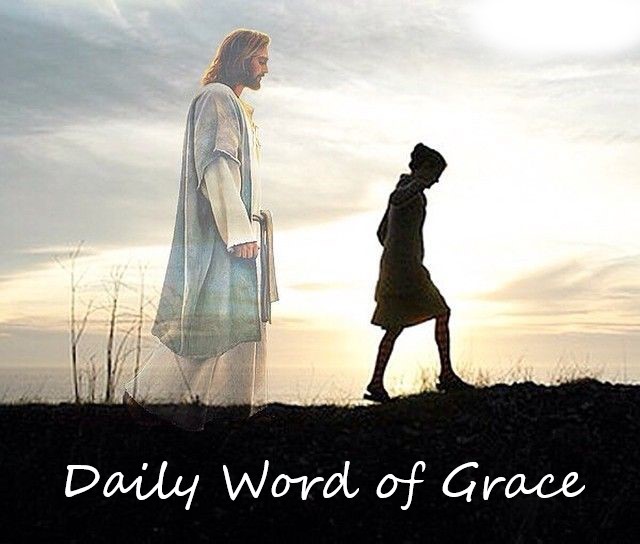
Daily Word of Grace # 249 (May 26, 2021)
In his powerful book Abba’s Child the late Brennan Manning recounts the following story about the famous British writer G. K. Chesterton (1874-1936), who was also a brilliant philosopher, theologian, and literary critic: “Standing on a London street corner, G. K. Chesterton was approached by a newspaper reporter. ‘Sir, I understand that you recently became a Christian. May I ask you one question?’ ‘Certainly,’ replied Chesterton. ‘If the risen Christ suddenly appeared at this very moment and stood behind you, what would you do?’ Chesterton looked the reporter squarely in the eye and said, ‘He is’” (97). G. K. Chesterton was exactly right, because that is exactly what the Risen Christ promised his disciples at the Great Commission: “All authority in heaven and earth has been given to me. Go therefore and make disciples of all nations, baptizing them in the name of the Father and of the Son and of the Holy Spirit, and teaching them to obey everything that I have commanded you. And remember, I am with you always, to the end of the age” (Matthew 28:18-20). This is true not only individually but also corporately because Jesus also promised, “Where two or three are gathered in my name, I am there among them” (Matthew 18:20). Today may the Risen Christ reveal anew to you both his love for you and his presence with you.
Love and Prayers,
Dave
Daily Word of Grace # 248 (May 25, 2021)
One of the seven penitential psalms (6, 32, 38, 51, 102, 130, and 143) is Psalm 130, De profundis: “Out of the depths have I called to you, O Lord; Lord, hear my voice; let your ears consider well the voice of my supplication. If you, Lord, were to note what is done amiss, O Lord, who could stand? For there is forgiveness with you; therefore you shall be feared. I wait for the Lord; my soul waits for him; in his word is my hope. My soul waits for the Lord, more than watchmen for the morning, more than watchmen for the morning. O Israel, wait for the Lord, for with the Lord there is mercy; with him there is plenteous redemption, and he shall redeem Israel from all their sins” (The Book of Common Prayer 784-785). When we find ourselves somehow in “the depths”—depression, doubt, stress, discouragement, you fill in the blank—there is always at least two things we can do: call out to the Lord and wait for the Lord to work things out. The challenge here is that most of us have high control needs and would rather try to figure out a way out of the depths on our own. In addition, most of us have a hard time waiting for anything, let alone for the Lord to work things out. And yet, when we do call out to the Lord and when we do wait for the Lord to work things out, the Lord always hears us and somehow always works things out—because indeed the Lord treats us with forgiveness, mercy, and “plenteous redemption.”
Love and Prayers,
Dave


Daily Word of Grace # 247 (May 24, 2021)
When Jacob, the younger of Isaac and Rebecca’s twins, was journeying alone through the wilderness he learned he was actually not alone at all. As he slept with a rock for a pillow he had a dream: “He dreamed that there was a ladder set up on the earth, the top of it reaching to heaven; and the angels of God were ascending and descending on it. And the Lord stood beside him and said, ‘I am the Lord, the God of Abraham your father and the God of Isaac; the land on which you lie I will give to you and to your offspring…Know that I am with you and will keep you wherever you go, and will bring you back to this land; for I will not leave you until I have done what I have promised you.’ Then Jacob woke from his sleep and said, ‘Surely the Lord is in this place—and I did not know it.’ And he was afraid, and said, ‘How awesome is this place! This is none other than the house of God, and this is the gate of heaven’” (Genesis 28:10-13 and 15-17). That image of angels ascending and descending a ladder reaching all the way to heaven always moves me. The Lord kept his promise to Jacob and indeed gave that land, the Promised Land, to his descendants. As the Lord was with Jacob, the Lord is with you. Moreover, that ladder prefigures a different ladder, the cross, where Jesus gave his life for you in order to open for you the gate to heaven. In other words, Jacob’s ladder is your ladder.
Love and Prayers,
Dave
Daily Word of Grace # 246 (May 21, 2021)
If the confession in “The Holy Eucharist: Rite Two” is anything, it is comprehensive: “Most merciful God, we confess that we have sinned against you in thought, word, and deed, by what we have done, and by what we have left undone. We have not loved you with our whole heart; we have not loved our neighbors as ourselves.” This includes all our sinful thoughts and actions, and breaking the two greatest commandments of loving God and loving our neighbor as ourselves (Matthew 22:37-39). This confession continues, “We are truly sorry and we humbly repent. For the sake of your Son Jesus Christ, have mercy on us and forgive us; that we may delight in your will, and walk in your ways, to the glory of your Name. Amen” (The Book of Common Prayer 360). The good news of the gospel is that our “most merciful God” is also comprehensive in forgiving us, as John reassures us, “If we confess our sins, he who is faithful and just will forgive us our sins and cleanse us from all unrighteousness” (1 John 1:9). As John further writes, this is because of Jesus’ death on the cross for us—“he is the atoning sacrifice for our sins, and not for ours only but also for the sins of the whole world” (1 John 2:2).
Love and Prayers,
Dave


Daily Word of Grace # 245 (May 20, 2021)
One of the most beautiful songs by Fleetwood Mac is their 1975 wistful gem “Landslide”, written and sung by the incomparable Stevie Nicks while she was in Aspen, Colorado: “Oh, mirror in the sky, what is love? Can the child within my heart rise above? Can I sail through the changing oceans tides? Can I handle the seasons of my life? Well, I’ve been afraid of changing ‘cause I’ve built my life around you. But time makes you bolder, children get older, and I’m getting older too…If you see my reflection in the snow covered hills, the landslide will bring you down.” Even though you may be growing older, even though the longing in your heart for the new remains, even if you feel like you are experiencing a landslide of changes in your life—the love of God for you never changes or grows old. James put it this way: “Every generous act of giving, with every perfect gift, is from above, coming down from the Father of lights, with whom there is not variation or shadow due to change” (James 1:17). The love of God for you is ever new. This unchanging love of God is good news in a world, and in our lives, both of which are constantly changing and contain many metaphorical landslides—because God’s love always has the last word.
Love and Prayers,
Dave
Daily Word of Grace # 244 (May 19, 2021)
One of the greatest novels of the nineteenth century is Fyodor Dostoyevsky’s The Brothers Karamazov (1879-1880), in which he describes the strained relationship between the dissolute father Fyodor Pavlovich Karamazov and his sons. It is filled with philosophical discussions about the existence of God, free will, and morality. A particularly famous section is called “The Grand Inquisitor” in which Jesus has returned to earth during the Spanish Inquisition. The octogenarian inquisitor has imprisoned Jesus and intends to burn him at the stake as a heretic. Beforehand, the inquisitor visits Jesus in his cell and, dripping with anger, rails at him about the human condition. How does Jesus (“the Prisoner”) respond? “When the Inquisitor ceased speaking, he waited some time for his Prisoner to answer him; His silence weighed down upon him. He saw that the Prisoner had listened intently all the time, looking gently in his face and evidently not wishing to reply. The old man longed for Him to say something, however bitter and terrible. But He suddenly approached the old man in silence and softly kissed him on his bloodless, aged lips. That was all his answer.” The good news of the gospel is that the Creator and Redeemer of the world responds to an angry and guilty world suffering from the flaws of the human condition not with more anger—but with a kiss of love and absolution.
Love and Prayers,
Dave
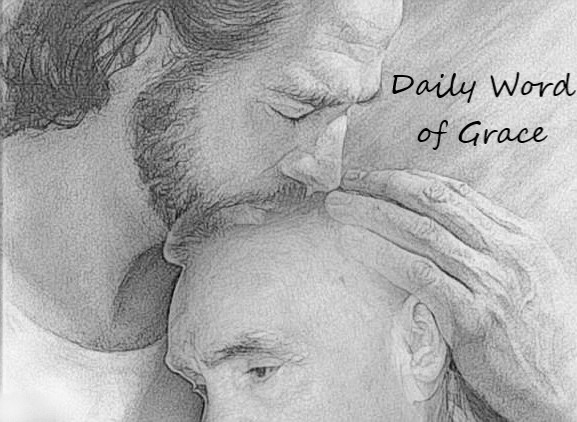
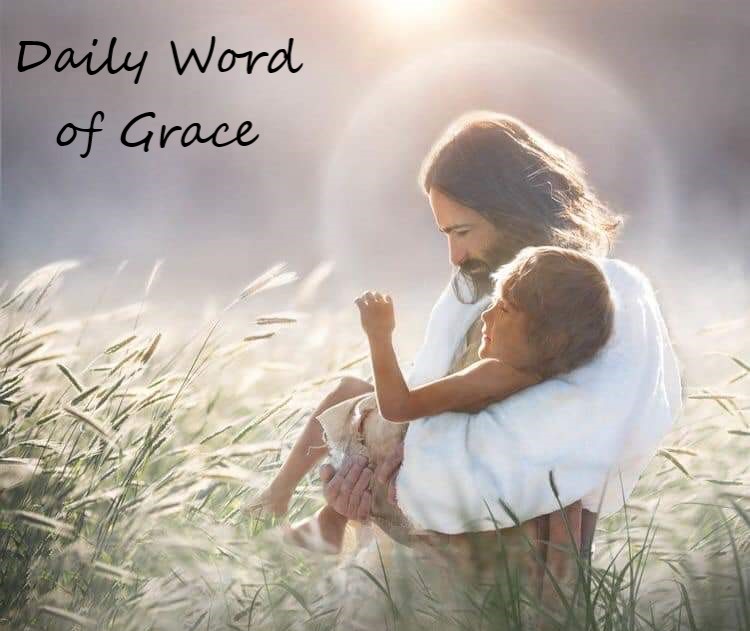
Daily Word of Grace # 243 (May 18, 2021)
In 1927 legendary blues guitarist Blind Willie Johnson recorded the song, “In My Time of Dying”, which was later covered by Bob Dylan on his 1962 debut album (Dylan used the lipstick case of girlfriend Suze Rotolo as a guitar slide on this recording—how cool is that?). This song was later by Led Zeppelin on their 1975 album Physical Graffiti, as Robert plant sings: “In my time of dying, want nobody to mourn. All I want for you to do is take my body home…Jesus gonna make up my dying bed…I know it’s got to be real. Oh Lord, deliver me all from all the wrong I’ve done. You can deliver me, Lord.” Jesus’ death and resurrection has indeed delivered us from all the wrong we’ve done, and ensures both our forgiveness and eternal life—as Jesus told a Pharisee named Nicodemus: “God so loved the world that he gave his only Son, so that everyone who believes in him may not perish but may have eternal life. Indeed, God did not send the Son into the world to condemn the world, but in order that the world might be saved through him” (John 3:16-17). This unconditional love of God gives us hope not only in our time of dying, but also in our time of living—now and evermore.
Love and Prayers,
Dave
Daily Word of Grace # 242 (May 17, 2021)
A particularly powerful collect (brief, theologically loaded prayer) in The Book of Common Prayer is this one: “O God, who hast prepared for those who love thee such good things as pass man’s understanding: Pour into our hearts such love toward thee, that we, loving thee in all things and above all things, may obtain thy promises, which exceed all that we can desire; through Jesus Christ our Lord, who liveth and reigneth with thee and the Holy Spirit, one God, for ever and ever. Amen” (174). This collect is rooted in God’s promises found in both the Old Testament and New Testament. The prophet Jeremiah wrote, “Surely I know the plans I have for you, says the Lord, plans for your welfare and not for harm, to give you a future with hope” (Jeremiah 29:11)—and similarly the Apostle Paul (citing from the prophet Isaiah) put it this way: “What no eye has seen, nor ear heard, nor the human heart conceived, what God has prepared for those who love him” (1 Corinthians 2:9). Jesus himself, speaking about heaven, takes a personal role in God’s wonderful plans for you: “And if I go and prepare a place for you, I will come again and will take you to myself, so that where I am, there you may be also” (John 14:3). We have the hope of attaining God’s promises because we are entirely dependent on the grace of God—and God always keeps his promises.
Love and Prayers,
Dave


Daily Word of Grace # 241 (May 14, 2021)
My parents are from Denver, Colorado and so three times when I was growing up in Virginia we took road trips to Colorado to see our relatives. The first of these trips was in the summer of 1976, when I was seven. While in Colorado we drove into the Rocky Mountains, which completely blew me away. One of my favorite albums at the time was John Denver’s Greatest Hits (1973)—featuring my all-time favorite song of his: “Rocky Mountain High”, which I played over and over again. In this song John Denver describes his transcendent experience of the presence of God in the magnificent beauty of the Rocky Mountains: “He was born in the summer of his 27th year, coming home to a place he’d never been before. He left yesterday behind him. You might say he was born again. You might say he found a key for every door. Now he walks in quiet solitude, the forest and the streams, seeking grace in every step he takes. His sight has turned inside himself to try and understand the serenity of a clear blue mountain lake. And the Colorado rocky mountain high, I’ve seen it raining fire in the sky. Talk to God and listen to the casual reply, rocky mountain high.” As we visited the Rocky Mountains, so close to where my parents were raised, I too felt like I was coming home to a place I’d never been before. The Creator of these mountains is also our Redeemer, who understands that we too are seeking grace with every step we take. And as “the giver of all grace” (1 Peter 5:10), God always responds with grace.
Love and Prayers,
Dave
Daily Word of Grace # 240 (May 13, 2021)
One of the defining characteristics of Jesus’ earthly ministry is his compassion—as Matthew assures us in his account of the gospel: “When he saw the crowds, he had compassion for them, because they were harassed and helpless, like sheep without a shepherd” (Matthew 9:36). In his 2011 book Falling Upward, Franciscan friar and author Richard Rohr beautifully describes the personal, individual aspect of God’s compassion for us: “Jesus did not seem to teach that one size fits all, but instead that God adjusts to the vagaries and failures of the moment. The ability to adjust to human disorder and failure is named God’s providence or compassion. Every time God forgives us, God is saying that God’s own rules do not matter as much as the relationship that God wants to create with us. Just the Biblical notion of absolute forgiveness, once experienced, should be enough to make us trust and seek and love God” (56-57). In his death on the cross as “the Lamb of God who takes away the sin of the world” (John 1:29) Jesus not only atoned for your sins, but also fulfilled God’s law (“God’s own rules”) in your place, which means as the Apostle Paul wrote, “you are not under law but under grace” (Romans 6:14). God’s compassion and grace are offered to the world, including you, personally and individually to minister to the you in the specific “vagaries and failures” of your life.
Love and Prayers,
Dave


Daily Word of Grace # 239 (May 12, 2021)
One of the psalms frequently read during the “Morning Prayer” service in The Book of Common Prayer is the “Jubilate” (Psalm 100): “O be joyful in the Lord all ye lands; serve the Lord with gladness and come before his presence with a song. Be ye sure that the Lord he is God; it is he who hath made us and not we ourselves; we are his people and the sheep of his pasture. O go your way into his gates with thanksgiving and into his courts with praise; be thankful unto him and speak good of his Name. For the Lord is gracious; his mercy is everlasting; and his truth endureth from generation to generation” (45). This is a joyful and theologically loaded psalm that reminds us that we did not make ourselves, but have been made by God—every heartbeat, every breath a gift. And as the sheep of God’s pasture we are also cared for by the Lord our shepherd (Psalm 23; John 10), who is indeed “gracious.” God’s mercy is not temporary but eternal, and indeed “his mercy is everlasting.” In a world of lies, God’s truth—the truth of the gospel that you are fully known, fully forgiven, fully loved by God—indeed never ends but “endureth from generation to generation.” Who God is and what God has done (and continues to do) for us enables us to be joyful, and to respond with singing, thanksgiving, and praise.
Love and Prayers,
Dave
Daily Word of Grace # 238 (May 11, 2021)
We live in a world in which it is often dangerous to be vulnerable, to let down our guard, take off our mask, and be who we really are. In his beautiful 1986 book Lion and Lamb the late Brennan Manning describes the vulnerability of Jesus in his incarnation: “God entered into our world not with the crushing impact of unbearable glory, but in the way of weakness, vulnerability, and need. On a wintry night in an obscure cave, the infant Jesus was a humble, naked, helpless God who allowed us to get close to him…God comes as a newborn baby, giving us a chance to love him, making us feel that we have something to give him” (175). This never ceases to amaze me. This vulnerability of Jesus did not stop at his birth, but continued as he vulnerably preached about the love of God, touched untouchables, and taught about the Kingdom of God that requires us to become like children in order to enter it (Matthew 18:2-3)—and yes, as you know, children are vulnerable. Moreover, on the cross Jesus died the most vulnerable death imaginable, and the Risen Jesus still bears the scars of his vulnerability. What is true with God’s vulnerability toward us is also true in our vulnerability to one another—when we are vulnerable we give others the chance to love us as we actually are, and to give to us what only they can give.
Love and Prayers,
Dave
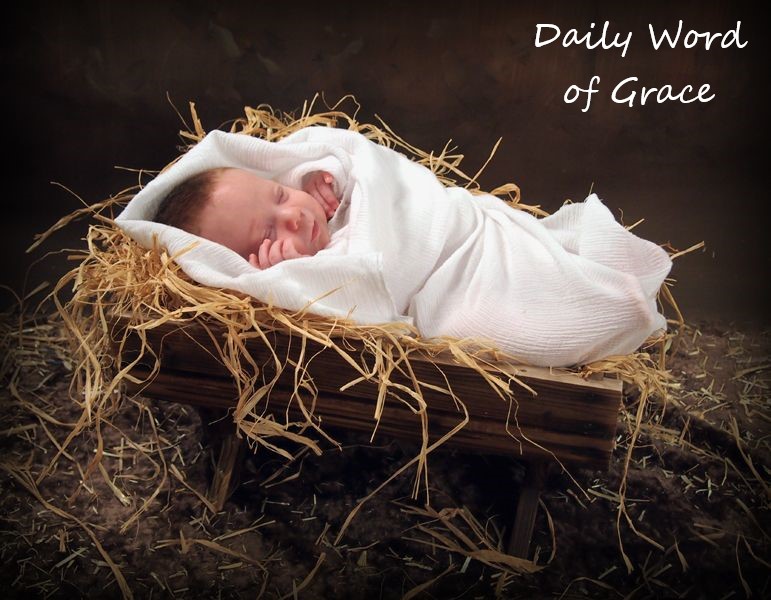

Daily Word of Grace # 237 (May 10, 2021)
After leaving the progressive British rock band Genesis, Peter Gabriel embarked on a stellar solo career. His first hit was “Solsbury Hill” (1977) in which he sings about a spiritual experience he had atop Little Solsbury Hill in Somerset, England. It is a uplifting song primarily in the unusual time signature of 7/4, a song about letting go and starting a new chapter: “Climbing up on Solsbury Hill, I could see the city light. Wind was blowing, time stood still. Eagle flew out of the night. He was something to observe, came in close, I heard a voice. Standing, stretching every nerve, had to listen had no choice. I did not believe the information, just had to trust imagination. My heart going boom, boom, boom. ‘Son,’ he said, ‘Grab your things. I’ve come to take you home.’” He then describes his response: “To keep in silence I resigned. My friends would think I was a nut. Turning water into wine. Open doors would soon be shut. So I went from day to day though my life was in a rut. Till I thought of what I’d say, which connection I should cut. I was feeling part of the scenery. I walked right out of the machinery. My heart going boom, boom, boom. ‘Hey,’ he said, ‘Grab your things. I’ve come to take you home.’” Such mountaintop experiences are not uncommon, though many people initially, Like Peter Gabriel, keep quiet about it lest others dismiss them as “a nut.” These experiences will indeed make your heart go “boom, boom, boom” because the One who turned water into wine (John 2:1-11) is very real and has very real plans for your life. And ultimately you too will hear God say, “Grab your things. I’ve come to take you home.”
Love and Prayers,
Dave
Daily Word of Grace # 236 (May 7, 2021)
One of the most moving and vulnerable songs by the South Carolina based band Needtobreathe is “Wasteland” from their 2014 album Rivers in the Wasteland in which they sing: “There was a greatness I felt for a while but somehow it changed. Some kind of blindness I used to protect me from all of my stains. Yeah I wish this was vertigo. It just feels like I’m falling slow. Oh if God is on my side, then who can be against me? Yeah in this wasteland where I’m living there is a crack in the door filled with light, and it’s all that I need to get by. Yeah in this wasteland where I’m living there is a crack in the door filled with light, and it’s all that I need to shine.” In the same way the Israelites wandered the wilderness for forty years, many of us have seasons in our lives when we feel like we are also wandering in the wilderness, or a wasteland. And yet the psalmist assures us that God “turns a desert into pools of water, a parched land into springs of water” (Psalm 107:35). God is indeed on our side, just as the Apostle Paul wrote, “If God is for us, who is against us? (Romans 8:31)—so on our side in fact, that he died to save us and to cleanse us from all of our stains. Moreover, no matter how dark it gets in the wasteland, Jesus remains the light of the world (John 8:12) so that there is indeed “a crack in the door filled with light”—now and always.
Love and Prayers,
Dave
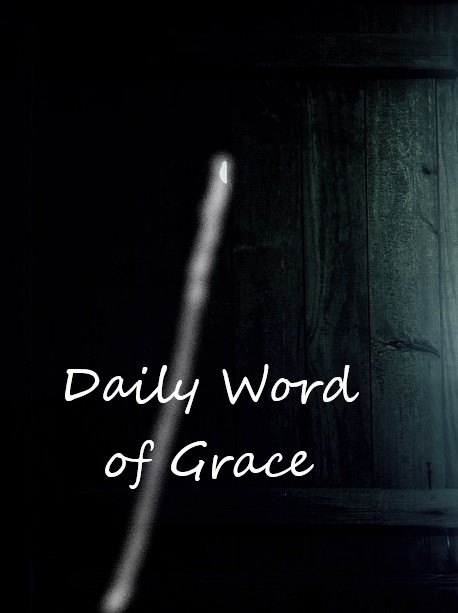

Daily Word of Grace # 235 (May 6, 2021)
Undoubtedly one of the greatest novelists of all time is the incomparable Charles Dickens (1812-1870). While he was prolific and popular he was often criticized by wealthy people for his honest and empathetic descriptions of the indigent and marginalized, the down and out. Part of his gift for this was based on his painful childhood experience of seeing his father sent to debtors prison and his therefore having to work in a boot blacking factory as a boy, where he experienced firsthand what he would write about in so many of his novels: the struggles of the poor. In his preface to Oliver Twist Dickens bluntly wrote, “But as the stern truth, even in the dress of this (in novels) much exalted race, was a part of the purpose of this book, I did not, for these readers, abate one hole in the Dodger’s coat, or one scrap of curl-paper in Nancy’s disheveled hair. I had no faith in the delicacy which could not bear to look upon them. I had no desire to make proselytes among such people. I had no respect for their opinion, good or bad; did not covet their approval; and did not write for their amusement.” In his incarnation Jesus was born in a barn, raised by a carpenter, lived and ministered among the poor, and was crucified among criminals. Jesus never has turned a blind eye to “the stern truth” of the struggles of humanity, including your personal struggles. Jesus is fully aware of every hole in your coat and every scrap of curl paper in your disheveled hair—and has always been and will always be “moved with compassion” (Matthew 9:36) for you.
Love and Prayers,
Dave
Daily Word of Grace # 234 (May 5, 2021)
The third and final stanza of the brilliant nineteenth century poet Christina Rossetti’s poem “The Thread of Life” reads: “Therefore myself is that one only thing I hold to use or waste, to keep or give; My sole possession every day I live, and still mine own despite Time’s winnowing. Ever mine own, while moons and seasons bring from crudeness ripeness mellow and sanative; Ever mine own, till Death shall ply his sieve; And still mine own, when saints break grave and sing. And this myself as king unto my King I give, to Him Who gave himself for me; who gives Himself to me, and bids me sing a sweet new song of His redeemed set free; He bids me sing: O death, where is thy sting? And sing: O grave, where is thy victory?” Before raising Lazarus from the dead Jesus Christ proclaimed, “I am the resurrection and the life. Those who believe in me, even though they die, will live” (John 11:25). And shortly thereafter he gave himself, his very life, on the cross for you. The only response to God’s love is surrender, giving ourselves to the One who gave himself for us (Galatians 2:20)—and join Christina Rossetti in singing “a sweet song of His redeemed set free”, which includes you and means you can echo Christina Rossetti and the Apostle Paul, “O death, where is the sting? O grave, where is thy victory?” (1 Corinthians 15:55).
Love and Prayers,
Dave
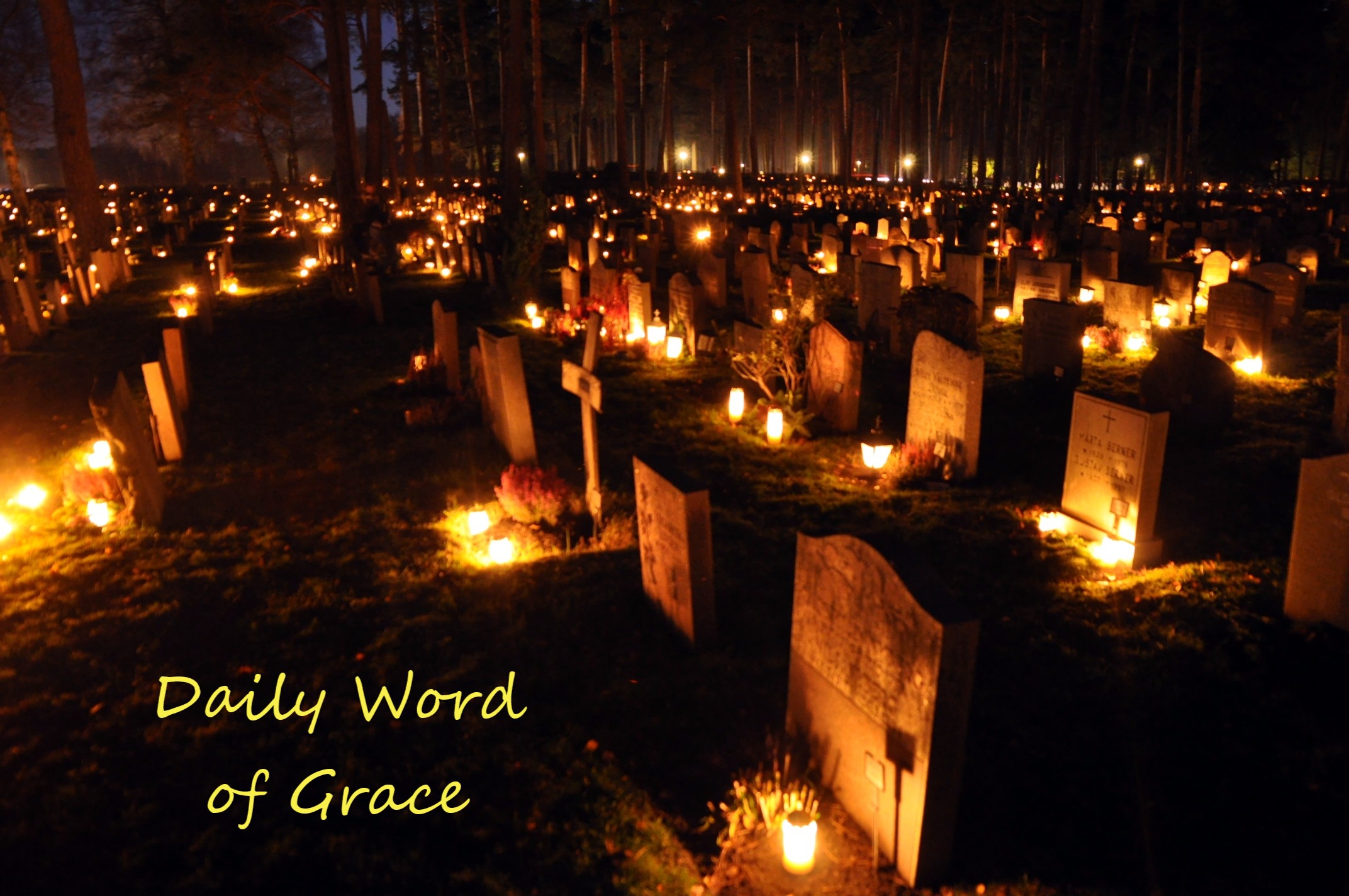
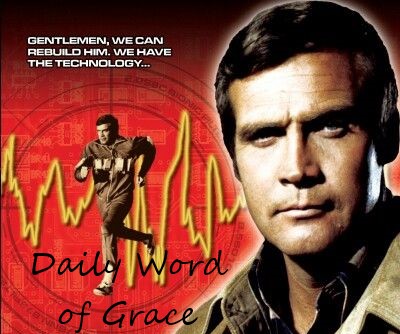
Daily Word of Grace # 233 (May 4, 2021)
As a kid growing up in the 70’s one of my favorite TV shows was The Six Million Dollar Man starring Lee Majors as Steve Austin an Air Force pilot who suffered a horrendous plane crash. The narrator recounts in the famous voiceover during the opening theme: “Steve Austin: an astronaut, a man barely alive. Gentlemen, we can rebuild him. We have the technology. We have the capability to make the world’s first bionic man. Steve Austin will be that man—better than he was before: better, stronger, faster.” Following major surgery Steve Austin not only survived, but was indeed “better, stronger, faster”—with superhuman bionic sight, hearing, strength and speed—all of which proved handy in his fight against crime and corruption—and always accompanied by really cheesy but really cool special effects. Like Steve Austin, most people in their lives experience a crash of some kind—perhaps not a plane crash, but some other traumatic event that leaves you “barely alive.” That’s the bad news. The good news is that the grace of God in Jesus Christ meets you exactly in that place. This grace of God can not only save you but also make you “better than before”—more compassionate, more approachable, more trusting in the One who can and does rebuild you.
Love and Prayers,
Dave
Daily Word of Grace # 232 (May 3, 2021)
One of the most accomplished songwriters and guitarists in country music is Vince Gill. In 1995 he released his award winning song “Go Rest High on That Mountain” from his album When Love Finds You. He wrote this song following the death of his beloved older brother Bob. Along with Patty Loveless, Vince sang this song at the 2013 funeral of legendary country artist George Jones: “I know your life on earth was troubled, and only you could know the pain. You weren’t afraid to face the devil. You were no stranger to the rain. Go rest high on that mountain. Son, your work on earth is done. Go to heaven a-shouting love for the Father and the Son. Oh, how we cried the day you left us. We gathered ’round your grave to grieve. Wish I could see the angels faces when they hear your sweet voice sing. Go rest high on that mountain. Son, your work on earth is done. Go to heaven a-shouting love for the Father and the Son.” In Jesus Christ God’s love has found you—and this love can bring settling where you are troubled, healing where you have pain, courage when you face the devil, and shelter in the rain. When it comes to your salvation, in Jesus Christ “your work on earth” has already been done, which means when your time comes to cross the river to eternal life you too will “go rest high on that mountain” and “go to heaven a-shouting love for the Father and the Son.”
Love and Prayers,
Dave

Father Dave was on Sabbatical so there are no posting from January 7 – April 4, 2021.
The rest of the Daily Word of Grace posts can be found on the Archive page.